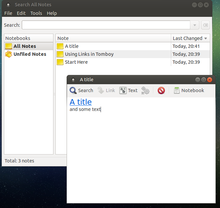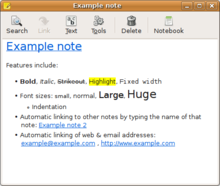
GNOME Evolution is the official personal information manager for GNOME. It has been an official part of GNOME since Evolution 2.0 was included with the GNOME 2.8 release in September 2004. It combines e-mail, address book, calendar, task list and note-taking features. Its user interface and functionality is similar to Microsoft Outlook. Evolution is free software licensed under the terms of the GNU Lesser General Public License (LGPL).

gedit is a text editor designed for the GNOME desktop environment. It was GNOME's default text editor and part of the GNOME Core Applications until GNOME version 42 in March 2022, which changed the default text editor to GNOME Text Editor. Designed as a general-purpose text editor, gedit emphasizes simplicity and ease of use, with a clean and simple GUI, according to the philosophy of the GNOME project. It includes tools for editing source code and structured text such as markup languages.

The SWORD Project is the CrossWire Bible Society's free software project. Its purpose is to create cross-platform open-source tools—covered by the GNU General Public License—that allow programmers and Bible societies to write new Bible software more quickly and easily.
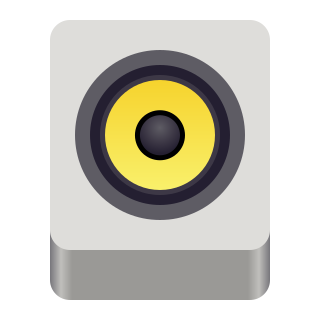
Rhythmbox is a free and open-source audio player software, tag editor and music organizer for digital audio files on Linux and Unix-like systems.

Microsoft OneNote is a note-taking software developed by Microsoft. It is available as part of the Microsoft Office suite and since 2014 has been free on all platforms outside the suite. OneNote is designed for free-form information gathering and multi-user collaboration. It gathers users' notes, drawings, screen clippings, and audio commentaries, and notes can also be shared with other OneNote users over the Internet or a network.
Textile is a lightweight markup language that uses a text formatting syntax to convert plain text into structured HTML markup. Textile is used for writing articles, forum posts, readme documentation, and any other type of written content published online.

GNOME Keyring is a software application designed to store security credentials such as usernames, passwords, and keys, together with a small amount of relevant metadata. The sensitive data is encrypted and stored in a keyring file in the user's home directory. The default keyring uses the login password for encryption, so users don't need to remember another password.
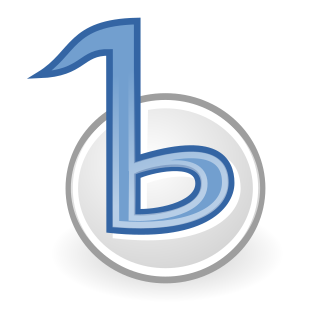
Banshee is a cross-platform open-source media player, called Sonance until 2005. Built upon Mono and Gtk#, it used the GStreamer multimedia platform for encoding, and decoding various media formats, including Ogg Vorbis, MP3 and FLAC. Banshee can play and import audio CDs and supports many portable media players, including Apple's iPod, Android devices and Creative's ZEN players. Other features include Last.fm integration, album artwork fetching, smart playlists and podcast support. Banshee is released under the terms of the MIT License. Stable versions are available for many Linux distributions, as well as a beta preview for OS X and an alpha preview for Windows.
A personal wiki is wiki software that allows individual users to organize information on their desktop or mobile computing devices in a manner similar to community wikis, but without collaborative software or multiple users.

Ubuntu One is an OpenID-based single sign-on service operated by Canonical Ltd. to allow users to log onto many Canonical-owned Web sites. Until April 2014, Ubuntu One was also a file hosting service and music store that allowed users to store data "in the cloud".
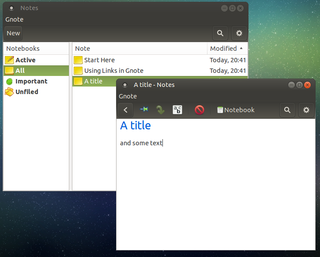
Gnote is a free and open-source desktop note-taking application written for Linux, cloned by Hubert Figuière from Tomboy. It uses a Wiki-like linking system to connect notes together. Gnote is part of the GNOME desktop environment, often filling the need for personal information management. The main principle is a notepad with a wiki-style interface. Words in the note body that match existing note titles automatically become hyperlinks, allowing for the management of large libraries of personal information, such as references to favorite artists that would then automatically be highlighted in notes containing their names. Plugins extend the program to include functionality like exporting to HTML and printing support. As of version 0.8.0, Gnote has been ported to GTK+3.

GTK is a free and open-source cross-platform widget toolkit for creating graphical user interfaces (GUIs). It is licensed under the terms of the GNU Lesser General Public License, allowing both free and proprietary software to use it. It is one of the most popular toolkits for the Wayland and X11 windowing systems.
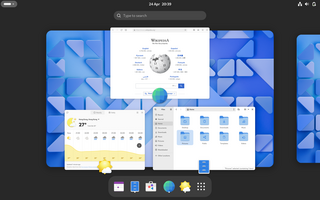
GNOME, originally an acronym for GNU Network Object Model Environment, is a free and open-source desktop environment for Linux and other Unix-like operating systems.

GNOME Shell is the graphical shell of the GNOME desktop environment starting with version 3, which was released on April 6, 2011. It provides basic functions like launching applications, switching between windows and is also a widget engine. GNOME Shell replaced GNOME Panel and some ancillary components of GNOME 2.

LightDM is a free and open-source X display manager that aims to be lightweight, fast, extensible and multi-desktop. It can use various front-ends to draw User Interface, also called Greeters. It also supports Wayland.

Mono is a free and open-source .NET Framework-compatible software framework. Originally by Ximian, it was later acquired by Novell, and is now being led by Xamarin, a subsidiary of Microsoft and the .NET Foundation. Mono can be run on many software systems.

Zim is a graphical text editor designed to maintain a collection of locally stored wiki-pages, a personal wiki. Each wiki-page can contain things like text with simple formatting, links to other pages, attachments, and images. Additional plugins, such as an equation editor and spell-checker, are also available. The wiki-pages are stored in a folder structure in plain text files with wiki formatting. Zim can be used with the Getting Things Done method.

FBReader is an e-book reader for Linux, Microsoft Windows, Android, and other platforms.
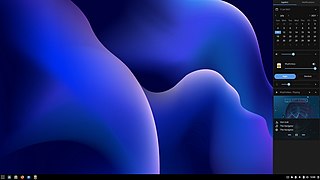
Budgie is a desktop environment that currently uses GNOME technologies such as GTK and is developed by contributors from numerous communities such as Solus, Arch Linux, Manjaro, openSUSE Tumbleweed and Ubuntu Budgie. Budgie's design emphasizes simplicity, minimalism, and elegance. The GTK library used for all releases up to Budgie 10 will be replaced with the Enlightenment Foundation Library (EFL) for the upcoming Budgie 11 release.

Foliate is a free e-book reading application for desktop Linux systems. The name refers to leaves, meaning "(getting) leafy" or "…-leaved".

